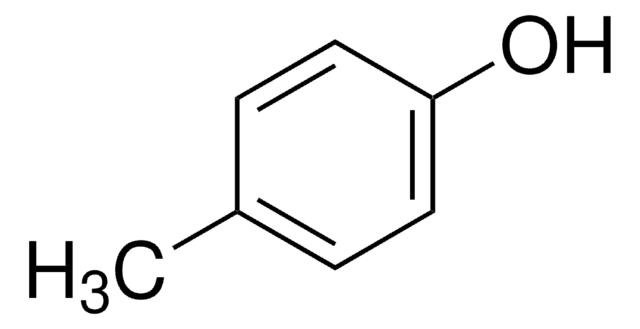60370
Potassium hydroxide
puriss. p.a., ≥86% (T), pellets
Synonym(s):
Caustic potash
About This Item
Recommended Products
vapor pressure
1 mmHg ( 719 °C)
Quality Level
grade
puriss. p.a.
Assay
≥86% (T)
form
pellets
impurities
≤0.0005% total nitrogen (N)
≤0.6% potassium carbonate (K2CO3)
pH
~13.5 (25 °C, 5.6 g/L)
mp
361 °C (lit.)
solubility
alcohol: soluble(lit.)
water: soluble(lit.)
anion traces
chloride (Cl-): ≤50 mg/kg
phosphate (PO43-): ≤5 mg/kg
silicate (as SiO2): ≤5 mg/kg
sulfate (SO42-): ≤40 mg/kg
cation traces
Ag: ≤5 mg/kg
Al: ≤5 mg/kg
Ba: ≤5 mg/kg
Bi: ≤5 mg/kg
Ca: ≤10 mg/kg
Cd: ≤5 mg/kg
Co: ≤5 mg/kg
Cr: ≤5 mg/kg
Cu: ≤5 mg/kg
Fe: ≤5 mg/kg
Hg: ≤0.1 mg/kg
Li: ≤5 mg/kg
Mg: ≤5 mg/kg
Mn: ≤5 mg/kg
Mo: ≤5 mg/kg
Na: ≤5000 mg/kg
Ni: ≤5 mg/kg
Pb: ≤5 mg/kg
Sr: ≤5 mg/kg
Zn: ≤5 mg/kg
SMILES string
[OH-].[K+]
InChI
1S/K.H2O/h;1H2/q+1;/p-1
InChI key
KWYUFKZDYYNOTN-UHFFFAOYSA-M
Looking for similar products? Visit Product Comparison Guide
General description
Application
- As an etching agent for the laser modified silica glass. It selectively facilitates etching on exposure to femtosecond laser.
- As a catalyst for the transformation of palm oil along with methanol to methyl esters, via transesterification reaction.
- Preparation of potassium hydroxide catalyst supported on palm shell activated carbon, which is used for the transesterification of palm oil.
- To improve the catalytic efficacy of X, Y and ZSM (Zeolite Socony Mobil)-5 zeolites during the synthesis of methyl methacrylate.
Other Notes
Signal Word
Danger
Hazard Statements
Precautionary Statements
Hazard Classifications
Acute Tox. 4 Oral - Eye Dam. 1 - Met. Corr. 1 - Skin Corr. 1A
Storage Class Code
8A - Combustible corrosive hazardous materials
WGK
WGK 1
Flash Point(F)
Not applicable
Flash Point(C)
Not applicable
Regulatory Listings
Regulatory Listings are mainly provided for chemical products. Only limited information can be provided here for non-chemical products. No entry means none of the components are listed. It is the user’s obligation to ensure the safe and legal use of the product.
ISHL Indicated Name
Substances Subject to be Indicated Names
ISHL Notified Names
Substances Subject to be Notified Names
JAN Code
60370-6X1KG:4548173270784
60370-25KG:
60370-1KG:4548173173429
60370-5KG:4548173173443
60370-250G:4548173173436
60370-VAR:
60370-BULK:
Certificates of Analysis (COA)
Search for Certificates of Analysis (COA) by entering the products Lot/Batch Number. Lot and Batch Numbers can be found on a product’s label following the words ‘Lot’ or ‘Batch’.
Already Own This Product?
Find documentation for the products that you have recently purchased in the Document Library.
Customers Also Viewed
Our team of scientists has experience in all areas of research including Life Science, Material Science, Chemical Synthesis, Chromatography, Analytical and many others.
Contact Technical Service









